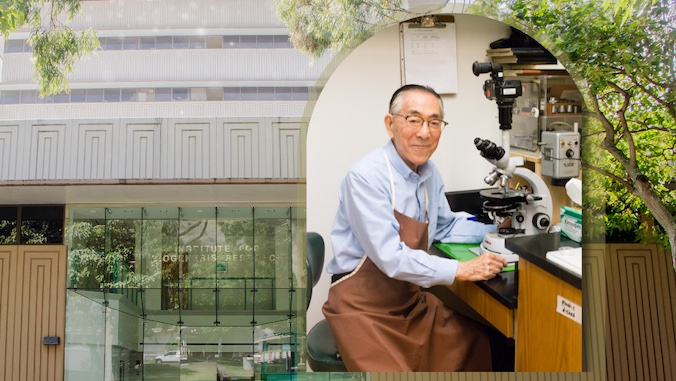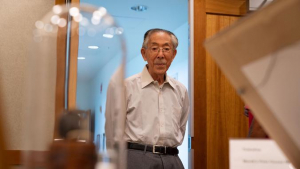
Ryuzo Yanagimachi’s legacy lives on through his groundbreaking work and the personal stories shared by those who knew him best. Known as the “Father of IVF,” Yanagimachi, a pioneering scientist at the University of Hawaiʻi at Mānoa’s Institute for Biogenesis Research (IBR), part of the John A. Burns School of Medicine (JABSOM), died in 2023, shortly before receiving the Kyoto Prize in Biotechnology and Medical Technology.
Related UH News story: In memoriam: Ryuzu Yanagimachi, cloning pioneer
Kyoto Prize recipients give speeches at three venues: a grand ceremony in Kyoto, the University of Oxford, and University of California, San Diego (UCSD), where 200 local high school students attend. At UCSD, Steven Ward, who was recruited by Yanagimachi and has served as the IBR director since 2009, spoke on behalf of his late mentor.
“I had known the man for 28 years and worked side by side with him every day for 23. He had 50 years of science and published 400 papers,” Ward said. “I could have spent a week talking about what he did and what he contributed to the field.”
Rather than focusing on Yanagimachi’s scientific achievements, Ward shared personal stories. He remembered his mentor through an oral history, drawing from personal experiences and Life in Science articles Yanagimachi had written over the years.
“Yana was famous enough that people wanted to know his life story in written print. You don’t see this very often,” Ward said. “Those were really interesting because I got a real insight into why he was doing experiments.”
Impact beyond research
Yanagimachi’s influence extended beyond his research. Ward explained that his cloning breakthroughs likely helped save UH’s medical school from closure. In 1999, the UH Faculty Senate voted to merge the school with the School of Public Health.

“When I moved here in 2000, they were talking about closing the medical school. Then Yana’s cloning stuff came up and lit the world on fire,” Ward said.
Ward also emphasized how Yanagimachi’s mentorship encouraged innovation. “He gave his researchers freedom,” Ward said, recalling how Yanagimachi fostered new ideas, including the “Honolulu method” of cloning. “He believed in letting us experiment and explore.”
Ward’s oral history approach was well-received and sparked discussions about changing how future Kyoto Prize speeches are structured.

As JABSOM continues to mourn the loss of their pioneer, Ward intends to continue passing along the history of one of the most influential scientists at UH.
“There are certain things you’ll never get written down that you only have from these oral histories. So it’s important for people to talk to each other,” he said. “It’s important for the younger generation to talk to the older scientists in the community so that they get those things that are never written down.”
In recognition of his contributions, IBR will be renamed the “Yanagimachi Institute for Biogenesis Research,” and a symposium in his honor is planned.

